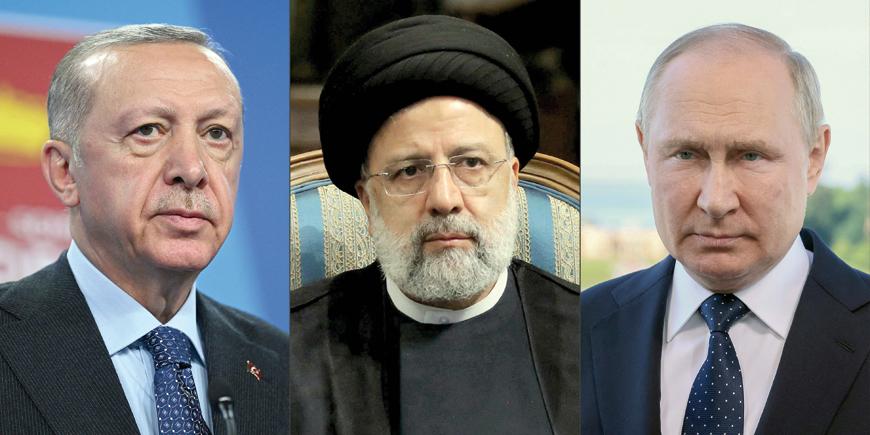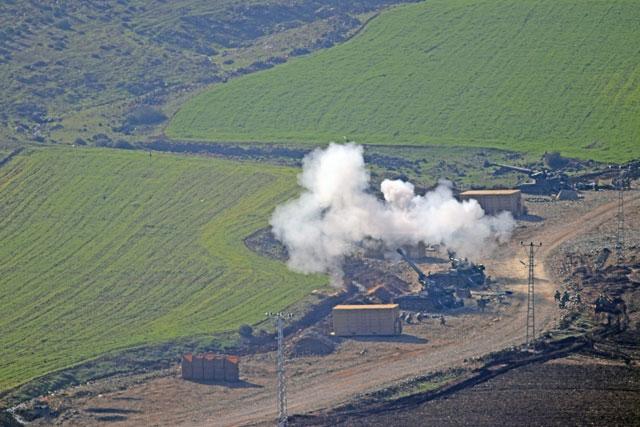You are here
Iran, Russia, Turkey team up to hold sway in Syria
By AFP - Apr 03,2018 - Last updated at Apr 03,2018
ANKARA, Istanbul — Iran, Russia and Turkey have teamed up to forge a strong if brittle tripartite alliance aimed at holding ascendancy in Syria, taking advantage of the West’s reluctance to engage militarily in the country.
The presidents of the three countries, long seen as regional rivals rather than strategic allies, will meet on Wednesday in Ankara for their second three way summit on Syria in a striking demonstration of unity.
This meeting, which follows the first tripartite summit between Turkish President Recep Tayyip Erdogan, Vladimir Putin of Russia and Iran’s Hassan Rouhani in Sochi last November, comes with Turkey seeking a louder voice after launching an offensive against Kurdish militia inside Syria.
US President Donald Trump has signalled that Washington will be withdrawing “very soon” from Syria, in a move that would cement the influence of Ankara, Moscow and Tehran, who have all committed military forces to the ground.
Sinan Ulgen, chairman of the Istanbul-based Centre for Economics and Foreign Policy Studies think tank, said the three countries had now become the true masters on the ground in Syria.
Ulgen told AFP that the three have “been the regional powers that were willing to invest military resources to influence the outcome of the conflict.”
‘Built up leverage’
The three countries last year launched a parallel peace process to the UN-backed talks in Geneva. The talks, based in Astana, have convened multiple times albeit without finding any breakthrough.
“The Astana process is a vehicle through which Turkey, Russia, and Iran, are looking to manage the war and secure their various interests,” said Elizabeth Teoman, a Turkey analyst at the Washington-based Institute for the Study of War (ISW).
Russia has substantial air power in Syria while Iran has a strong presence on the ground, partly through militia groups which include foreign fighters.
But Erdogan has increased Turkey’s influence by launching in January an offensive to capture territory from the Kurdish People’s Protection Units (YPG) militia.
The offensive has already succeeded in capturing the former YPG bastion of Afrin and Erdogan has repeatedly threatened to advance the push further east.
“Erdogan is a weaker partner in terms of ground forces and control over airspace. But he has built up leverage and proven he can create facts on the ground,” Teoman said.
‘Stage management’
Yet, analysts remain sceptical about the long term viability of an alliance between three powers who spent much of their imperial history at war and vying for influence in the Black Sea region.
In theory they also remain on different sides of the conflict — with Moscow and Tehran giving military support to the Syrian regime of President Bashar Assad, but Turkey repeatedly calling for Assad’s ouster.
Turkey’s focus now is to prevent the YPG from controlling an area that could form the base of a long autonomous region in postwar Syria from the Iraqi border to the Mediterranean.
Turkish officials say this would be a threat to national security.
Russia, meanwhile, wants to be able to extricate itself from Syria and not be bogged down in any quagmire reminiscent of the Soviet war in Afghanistan.
But Iran’s priority is to win the major political influence so it can call the shots like in Iraq.
“Russia and Turkey have shared interests, but those interests are against Iran and the regime’s, so you have Moscow trying to stage manage three partners that hate each other,” said Aaron Stein, senior resident fellow at the Atlantic Council’s Rafik Hariri Center for the Middle East
‘Alignment of convenience’
Moscow and Ankara claim to have made up following the crisis that followed when Turkey shot down a Russian plane over Syria in 2015 and Putin will meet with Erdogan for a bilateral meeting on Tuesday.
Turkish officials acknowledge that Ankara could not have launched its operation against the YPG without a green light from Moscow.
“We wouldn’t even have been able to put up a drone there!” Erdogan’s adviser Ilnur Cevik told CNN Turk broadcaster.
Yet relations between Ankara and Moscow are never plain sailing and Turkey has been bitterly critical of the assault by Moscow’s ally Assad on rebel-held Eastern Ghouta.
Turkish-Iranian relations have the potential to be even more tricky and Ankara has expressed uneasiness over Tehran’s attitude towards Kurdish rebels.
Tehran angered Turkey by urging it to end its Syria offensive while Cevik accused Iran of cooperating with the outlawed Kurdistan Workers’ Party.
“Iran does not want Turkey to be strong,” he said.
Jennifer Cafarella, a Syria expert at ISW, described Erdogan’s relationship with Iran and Russia as an “alignment of convenience”.
“He’ll remain aligned with them as long as he deems it necessary to pursue his goals against the YPG,” she said.
Related Articles
JANDAIRIS, Syria — Turkey has reached a key milestone in its operation against Kurdish militia inside Syria by taking the town of Jandairis,
TEHRAN — With the war in Ukraine still raging, Russian President Vladimir Putin travels on Tuesday to Tehran for talks with his Iranian and
ISTANBUL — Turkey said on Thursday it is planning to host in Istanbul a new three-way summit on Syria with the presidents of Russia and Iran



















